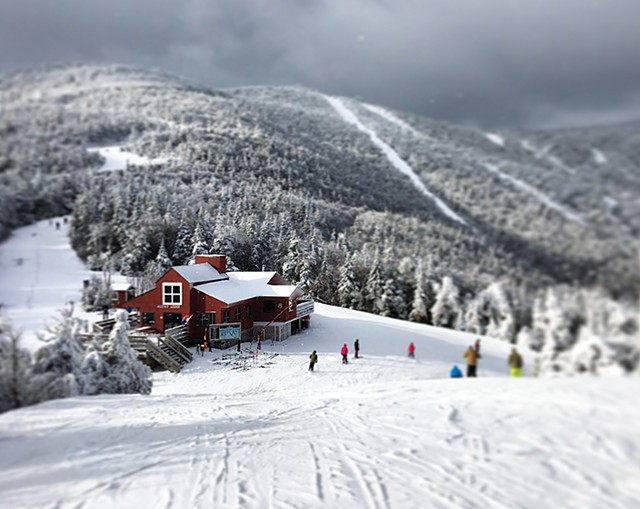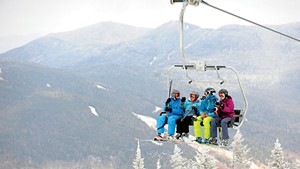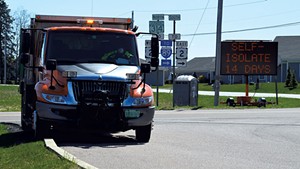
- Courtesy of Charlotte Harris
- Sugarbush Resort shut down Sunday
All of Vermont's major ski areas have shut down amid the growing spread of COVID-19, commonly known as the coronavirus. But the towns that host the resorts are bustling at levels normally seen at peak times during winter holidays, locals say.
The visitors, it seems, consider sparsely populated Vermont a safer place to hunker down than wherever they live full time.
The influx hasn't gone unnoticed by state legislators and many of their constituents.
"We just want to make sure that the governor understands that some of our weekend residents may not be leaving," Rep. Laura Sibilia (I-Dover) said on Sunday.
The closure of the resorts does not remove the incentive for people to "be here," she added: "It's Vermont. It's clean and safe and rural."
So far, the state has announced eight coronavirus cases. Of those, four involve non-Vermont residents, according to the state Department of Health.
Among them is a Westchester County, N.Y., man who came to his second home in Vermont “wanting to escape the virus," Health Commissioner Mark Levine said on Saturday. Instead, the man became "another coronavirus statistic” after starting to show symptoms within 24 hours of his arrival.
That's concerning to locals, who've seen crowds at restaurants, bowling alleys and grocery stores, plus traffic-clogged roadways with plenty of out-of-state license plates.
Oliver Olsen, a former state legislator, lives in Londonderry, a southern Vermont town not far from ski resorts including Stratton, Okemo and Bromley.
He observed lots of traffic in and around Manchester, as well as visitors who seemed to be loading up on groceries — even after ski areas announced they were shutting down. "People are stocking up, and they are not stocking up to take supplies back home," Olsen said.
He wondered if the health care systems designed for a smaller, year-round population would be overwhelmed. Calling attention to the influx of visitors now is important "because otherwise, we could be caught underprepared," Olsen said.
Sibilia said she and other lawmakers from resort towns, including Stowe, have been trading information and forwarding it to Gov. Phil Scott and emergency management leaders.
"I am seeing that out-of-staters are indeed here, and my biggest concern is that the people who are planning know that they are here and in what numbers they are here," said Rep. Kelly Pajala (I-Londonderry).
At her condo complex in Londonderry, where most of the units are owned by second-home owners, the parking lot was full Sunday, Pajala added.
Sibilia said constituents have been calling her.
"I think they are nervous about health care capacity. I've heard from folks about food," Sibilia said. Despite a "run" on grocery stores, Sibilia said she was confident the shelves will be restocked.
Many Vermont ski areas shut down after the last chair Saturday and were closed Sunday, including Stratton, Sugarbush, Jay Peak, Burke, Okemo, Killington and Stowe. Mad River Glen and Bolton Valley have also closed.
Whitney Phillips, who lives not far from Sugarbush in Warren, was taken aback by the traffic and crowds at restaurants over the weekend.
"I was surprised by how busy our valley was in the midst of all of this," Phillips told
Seven Days.
Phillips posted about the issue on Facebook, triggering an avalanche of responses.
Some suggested visitors and second-home owners taking an extended "snow day" in Vermont were putting others at risk.
"It is that kind of mentality that will allow this virus to spread," one wrote. "If second home owners are from an area that is endemic, they are supposed to stay home, period."
Another commenter urged calm and called out those who now want visitors to stay away.
"You can’t tell second home owners they are not allowed here cause we dont [sic] want them here, weeks ago you were welcoming them with open arms to spend their money, just wash your hands and keep your distance," the post read.
The issue got attention Saturday when the
New York Times published a story headlined, "The Rich Have a Coronavirus Cure: Escape From New York," which described monied residents decamping to rural second homes and vacation getaways.
The article mentioned the Wilburton in Manchester, an estate with an inn and private guest houses, that was making a pitch on its website to those
without second homes.
“As the Von Trapp Family singers fled Austria to the healing mountains of Vermont, please know you always have a safe space here too. Pack up your family and escape the panic, crowds and empty market shelves. (We have plenty of toilet paper here!),” the inn wrote.
By Sunday, Wilburton co-owner Melissa Levis had pulled that language off the property's website and said the article misconstrued her intent. "This has been perceived like I'm selling Purell for $99 a bottle, and I'm not," she told
Seven Days.
While she is still renting her guest houses, Levis said, she made the decision to close her family-owned inn for two months. She also canceled all group events there as a precaution and had to lay off her chef, she said.
The guest houses are a different setup with their own entrances and no housekeeping services, allowing visitors to be "in self-quarantine" with their families.
"I felt I was doing something for these people in New York who were trapped," she said.
As of Sunday, most of the Wilburton's guest houses were still available. The new message on its website urged: "Let’s work together to get through these unprecedented times."


















Comments (2)
Showing 1-2 of 2
Comments are closed.
From 2014-2020, Seven Days allowed readers to comment on all stories posted on our website. While we've appreciated the suggestions and insights, right now Seven Days is prioritizing our core mission — producing high-quality, responsible local journalism — over moderating online debates between readers.
To criticize, correct or praise our reporting, please send us a letter to the editor or send us a tip. We’ll check it out and report the results.
Online comments may return when we have better tech tools for managing them. Thanks for reading.